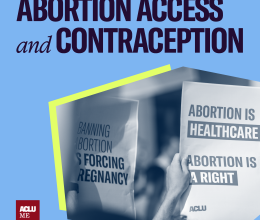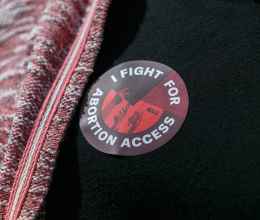ACLU, Planned Parenthood & Maine Family Planning Lawsuit Challenges Maine Law that Restricts Access to Safe Reproductive Health Care
Portland - The American Civil Liberties Union, Planned Parenthood, and the ACLU of Maine are in federal court today to challenge a Maine law that severely restricts access to abortion care in the medically underserved state.
The lawsuit, filed in the U.S. District Court for the District of Maine in September 2017, challenges a provision in Maine law that requires that abortions be performed solely by physicians and blocks advanced practice clinicians (APCs) like nurse practitioners and nurse-midwives from doing so, despite their rigorous post-graduate training and extensive clinical experience.
Plaintiffs include four APCs and two abortion providers in Maine: Julie Jenkins, Katie Riley, Alison Bates, Stephanie Small, Maine Family Planning, and Planned Parenthood of Northern New England.
Currently, APCs provide a wide range of health services of equal or greater complexity than abortion, including miscarriage management – which is identical to the procedure used for an early in-office abortion.
Citing strong safety data, medical authorities ranging from the World Health Organization, American College of Obstetricians and Gynecologists and the American Public Health Association have all concluded that laws prohibiting APCs from providing abortion services early in pregnancy are medically unfounded. APCs have been safely providing abortion care in other states, including New Hampshire and Vermont, for years.
There are only three publicly accessible health centers in Maine (in Augusta, Bangor and Portland) where a patient can get an aspiration abortion or any abortion care after 10 weeks. Some people in rural parts of the state have to travel as far as eight hours round trip for an abortion – even though there is a qualified health care provider in their community who could safely provide this care. While medication abortions are available in some cases via telehealth at Maine Family Planning’s clinics throughout rural Maine, the APC ban makes delivering medication abortion care via telehealth unnecessarily onerous.
As a result, some people must delay their abortion while they save money and arrange for transport, time off work, and child care, or forgo having an abortion at all. These barriers fall hardest on people who already face systemic barriers to health care, including people of color, people living in rural areas, young people and people with low incomes.
Last week, Gov. Janet Mills and Speaker of the House Sara Gideon introduced a bill, LD 1261, that would lift the ban.
The following quotes can be attributed as noted:
Julia Kaye, staff attorney with the ACLU Reproductive Freedom Project: “The State has admitted in this litigation that nurse practitioners and nurse-midwives are just as qualified as physicians to safely provide abortion services. Yet, because of this law, some Mainers have to travel for hours for an abortion instead of getting care from a trusted clinician in their own community. This law is not only bad public policy – it is plainly unconstitutional.”
Zachary Heiden, legal director of the ACLU of Maine: “We’re not going to let this become a country where people can’t access safe abortion care. We will do everything we can to ensure patients have more access to critical health care, not less.”
Leah Coplon, MPH, RN, Program Director at Maine Family Planning: “Maine’s APC ban is an unnecessary restriction on safe and legal abortion care. While we strive to expand access at clinics in rural Maine through our telemedicine abortion program, the APC ban makes providing those services needlessly burdensome for both patients and providers.”
Julie Jenkins, Nurse Practitioner at Maine Family Planning Belfast clinic: “Even though I safely provided abortion care in California, regularly perform procedures in Maine that are comparable to first-trimester abortion, and provide all of the in-clinic care for patients receiving a telemedicine abortion, I am blocked from providing early abortion care despite my rigorous training and extensive clinical experience. Abortion is the only healthcare service singled out in this way. It just doesn’t make sense, and it harms my patients.”
Alison Bates, Nurse Practitioner at Planned Parenthood of Northern New England: “As an Advanced Practice Clinician in Maine, I provide a wide range of health services to my patients, from pap tests and IUD insertions to endometrial biopsies. Abortion is the only service the state has singled out in law as beyond an APC’s scope of practice – and there’s no medical reason for it. The APC ban is outdated and medically unnecessary. It’s time to end it.”
More about this case can be found here: https://www.aclu.org/cases/jenkins-v-almy
The complaint can be found here: https://www.aclu.org/legal-document/jenkins-v-almy-complaint








